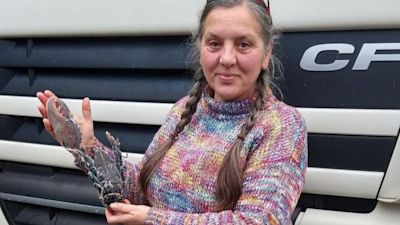'I'm waking up in cold sweats' The family business that lost thousands after Brexit delay

Watch the report by Jess Main
Nerys Edwards' family has been exporting Welsh shellfish to the EU for four generations.
Every week she loads up her lorry with thousands of pounds worth of catch ready to be shipped to customers in France and Spain.
But her first post-Brexit shipment earlier this month was delayed due to new checks and issues with paperwork.
Syren Shellfish sent the lorry from Pembrokeshire to the continent via Portsmouth.But new border rules - brought in as part of the UK's new relationship with the European Union - stopped the lorry in the French port of Caen.
She initially feared the delay would see her lose as much as £50,000.
"We lost a little, not as bad as it could have been, my customer was really on it they chilled the water right down". she said.
"We did lose all our spider crab, there was significant mortality in the velvets, but the shrimps the lobster and the brown crab weren't too bad."
Nerys admits she did make minor mistakes with the paperwork, but she says the real problem is the process; it must be simplified, she says.
"If we don't manage to streamline it as things get busier that backup is going to get worse and worse. I think that's what we're all worried about it's going to become untenable".
This week the UK Government announced seafood exporters hit by Brexit red tape and delays would be able to claim up to £100,000 in compensation, as part of a £23m funding scheme.
Environment Secretary George Eustice said, "This £23 million scheme will provide crucial support for fishermen and seafood exporters, who have experienced delays and a lack of demand for fish from the restaurant industry in the UK and Europe.
"We are continuing to work closely with the fishing and aquaculture sectors to make sure that they are supported, and can continue to fish whilst contributing to the economies of our coastal communities."
But while Nerys welcomes the prospect of support, she said making the process easier for exporters like herself should be the priority.
She told ITV Wales she had been "waking up in cold sweats" at the thought of going through the whole process again this week.
"It's not about the help, it's about making trading with the EU seam-free and manageable. I'm waking up in cold sweats at night worrying about doing it again."
Others in the industry also believe the levels of bureaucracy have increased tenfold.
Mussel farmer James Wilson is the director of Deep Dock Ltd, a mussel producer in North Wales.
He said one of his colleagues exported 10 bags of mussels into Europe, and that that shipment required 41 individual documents.
Mr Wilson said it is an issue that isn't going to resolve itself quickly.
He said, “Even when this resolves itself and the teething problems are smoothed out and the system becomes slick we will end up bearing a lot more cost we’ve got a huge amount more bureaucracy our customers have got a lot more bureaucracy and we’ll all have more uncertainty."
Until January 1, when the new trading deal came into effect, nearly all Welsh shellfish was being exported to the EU. But the industry relies on being able to export to the continent as quickly as possible to keep the produce alive.The shellfish industry in Wales is relatively small but it is an important part of many communities and the new border rules are a "major glitch" for those coastal communities, said Ms Edwards.The shellfish industry pumps around £13.3m into the Welsh economy, while the mussel industry injects a further £10.7m.